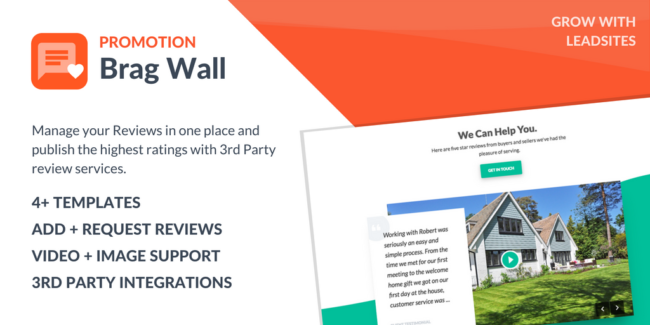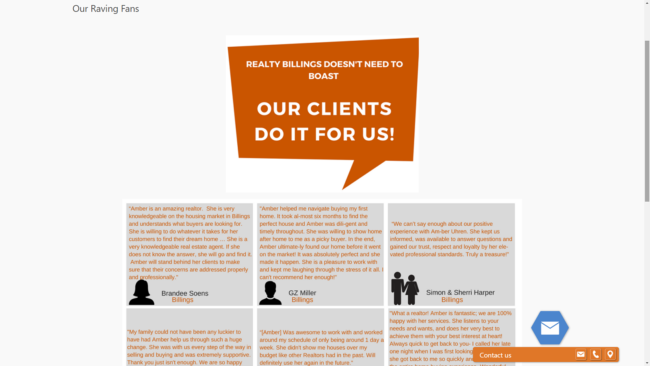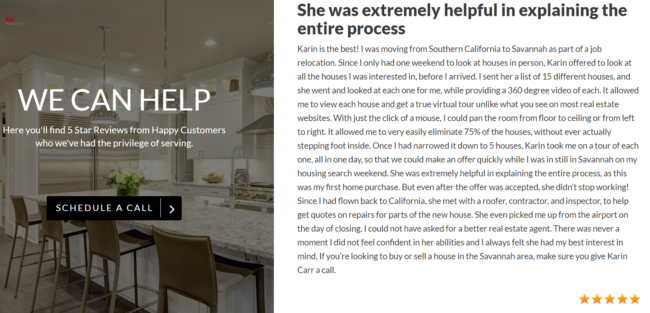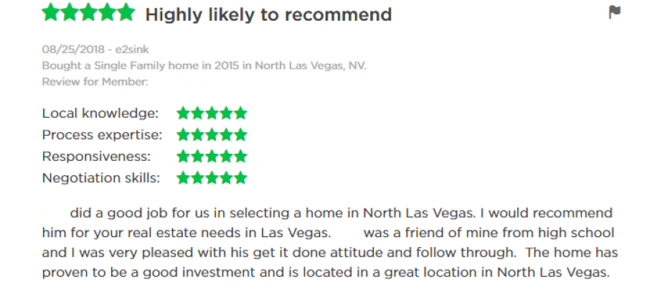What if we told you that all you need to do is tackle one task and you’ll realize a threefold return for your effort? Adding a real estate testimonial (aka social proof) to your website and marketing materials is the task. The return?
- Your real estate testimonial enables consumers to judge your credibility as a real estate authority
- It helps potential clients get to know you
- Social proof instills trust
As a bonus, if done right, it may even help with SEO.
Today, in our continuing series on website hacks (homepage, about me), we’re working on a page on your real estate website that will, if done right, do most of the heavy lifting when it comes to converting leads: your real estate testimonial page.
Want a harder working real estate website? Check out LeadSites, and get started for just $1.
Social proof is the magic elixir of lead conversion
Gone are the days when simply driving a luxury car will show potential clients how successful you are. Agents’ self-proclamations as specialists or top producers also fall on deaf ears.
Consumers in general and real estate consumers in particular are a cynical bunch. They take little that a company says at face value and many demand proof of its claims. And they want to hear it from those they trust: people who have used the services.
 Display social proof with Brag Wall and organize all of your reviews in one place – Learn More
Display social proof with Brag Wall and organize all of your reviews in one place – Learn More
Social proof isn’t new, it’s a well-worn phenomenon that now has a name. It describes our reliance on others’ opinions as a shortcut to making our own.
“Advertisers don’t have to persuade us that a product is good, they only need to say others think so,” claims author Rob Henderson at psychologytoday.com.
“Most of us do not have time to increase our knowledge of all merchandise and research every advertised item to measure its usefulness,” he continues.
“Instead, we rely on signals like popularity. If everyone else is buying something, the reasoning goes, there is a good chance the item is worth our attention.”
In a Mintel survey, most of the 2,000 participants claimed that online reviews were the yardstick they used to determine which services they’ll utilize and products they’ll buy.
“Do you read online customer reviews to determine whether a local business is a good business?” was one question in a survey conducted by the researchers at BrightLocal, a review monitoring and SEO tools firm.
A staggering 92 percent answered “yes,” with more than one-third stating that they read them “regularly.”
More than half of these respondents said that the number of stars a business receives is the most important part of a review with “quantity of reviews” and “recency of reviews” placing second and third in importance, respectively.
The majority claim that a business must have between three and five stars to merit their consideration.
The numbers don’t lie: if you truly want to build trust with your leads and convert them to clients, the testimonial page on your website is the place to start.
Which real estate testimonial to use?
It’s tempting to throw up every, single testimonial you receive, but it’s not wise. It’s important to read each one carefully to determine the value it will bring to the reader.
A REALTOR® Magazine consumer survey found that agent testimonials “must contain hard information and not bloviate,” according to the magazine’s Graham Wood. “The panelists were strongly critical of agents who posted testimonials that appeared overly self-serving,” he concluded.
Graham mentioned that panelists viewed one testimonial that credited the agent’s “smart marketing efforts” for selling his home in 19 days for asking price.
Viewers liked this testimonial, with one panelist saying that “The time-on-market figure lent the testimonial particular credibility, considering many online agent reviews are less detailed and sound automated.”
5 Real estate testimonial page best practices
1. Get that CTA in there
Aside from posting testimonials on it, the next aspect of this page that is critical is that it links to a contact page. Easy Agent Pro’s LeadSites link to a scheduling page, making this step a no-brainer for our clients.
2. Cut down on the clutter
The page should also be visually appealing. Cluttered, confused-looking pages will have visitors hitting the back button. Again, we hate to brag, but EAP’s LeadSites’ testimonials page is visually gorgeous.
If you’re designing your own, you won’t need to spend a huge amount of time on it – just enough just enough to let people know which page they’ve landed on and to make the testimonials easy to read.
Although we’d like to see the real names of clients, Realty Billings does offer up a clean, easy-to-read testimonials section on their website.

4. Go for quality over quantity
Not all seemingly “good” testimonials are worthy of placement on the testimonials page. Skip posting the one-liners (We Love Jane Doe!”) and use only those that highlight the value you bring to the transaction.
Keller Williams agent Karin Carr has a knack for choosing the best of the best when it comes to which testimonials she’ll use on her site.

Not only are these testimonials extremely detailed, you agents can pick up some brilliant customer service tips by reading them.
A quality real estate testimonial will “counter actual objections, not just praise your product or counter non-existent objections,” warns Copy Hacker co-founder Joanna Wiebe.
The best reviews also address what consumers consider most important, according to reputation and brand management firm ReviewInc:
- Reliability
- Expertise
- Professionalism
If you solicit testimonials from clients, structure your list of questions to elicit the quality responses you need to post to your testimonials page.
4. Don’t use testimonials from anonymous users or those using initials or screen names
Anonymous reviews are worthless and, apparently, even Google thinks so. The general public distrusts anonymous reviews (“Google User”) or those from people using initials or screen names.

Not only is this Zillow reviewer anonymous, he or she is a “friend” of the agent. Studies show that a reviewer’s subjectivity renders a review useless.
5. Consider including client photos with your real estate testimonial
“Testimonials with photos were significantly more effective at generating recall than testimonials with no photos,” according to Shanelle Mullin at conversionxl.com.
Since people trust other people more than they trust you, adding a photo of the person who left the review adds veracity and helps build trust.
Finally, don’t forget that “recency” is important to those who rely on online reviews to help make decisions. Dump the old ones and keep adding fresh, new testimonials.
Tip:
Use care when soliciting testimonials. Yelp expressly forbids asking for reviews and may ban you if they learn that you actively solicited a Yelp review. Google forbids the exchange of something of value or services in return for a review.
Get the hardest working website in Real Estate – Learn more
Looking for more real estate website hacks? Check out these 16 tips that drive leads.
Drive more traffic to you website with these keywords:
The post Real Estate Website hacks part III: Your real estate testimonial page appeared first on Easy Agent Pro.
from theokbrowne digest https://www.easyagentpro.com/blog/real-estate-testimonial-page/
No comments:
Post a Comment